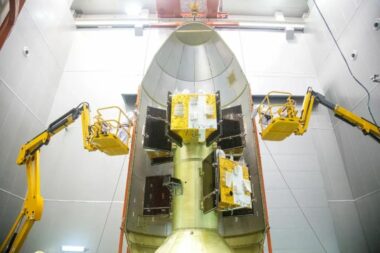Private Chinese satellite internet firm GalaxySpace secures major new funding

HELSINKI — Chinese satellite internet startup GalaxySpace has raised new funding which the company says puts its value at $1.58 billion.
The financing follows a November 2020 round which put the firm’s valuation at $1.2 billion and underlines the company’s strong position to make significant contributions to China’s planned 13,000-satellite strong national satellite internet megaconstellation.
The round was led by CCB International—an investment vehicle belonging to China Construction Bank Corporation, one of China’s big four banks—along with Anhui Sanzhongyichuang Industry Development Fund, Hefei Industry Investment and Sincere Fund. Previous backers Legend Capital and Chaos Investment furthered their investment.
GalaxySpace founder and CEO Xu Ming said the financing will be mainly used for the research and development of satellite Internet-related technologies and their commercial applications. GalaxySpace will also accelerate the research on core technologies including stackable satellites with flat panel antennas, multi-beam phased array technology, flexible solar arrays, digital processing payloads, and low-cost mass manufacturing capabilities for satellites, according to a company statement.
The company unveiled a stackable satellite bus with a phased array flat panel antenna and flexible solar array in late August during the National Science and Technology Week.
GalaxySpace says dozens of satellites can be stacked and launched at the same time on a single rocket, with the flat panel antennas and flexible arrays saving mass and space with the payload fairing.
The first of GalaxySpace’s stackable satellites are due to be launched early next year, according to the firm, and are the first of their kind to be developed in China.

In March GalaxySpace launched six communications satellites for an experimental network called the “Mini-spider constellation” using an earlier satellite bus. The satellites and their successful 5G network tests were also perceived to be relevant to China’s national broadband constellation plan.
“These six satellites will form an experimental network integrating communication and remote sensing,” Chang Ming of Galaxy Space told CCTV following the launch.
“When the whole experimental network forms, it will be verified in various application scenarios. It will also be the first technical verification for China’s low-orbit broadband satellite constellation.”
Beijing-based GalaxySpace was founded in 2016 with initial plans to construct its own, private satellite communications constellation.
The firm later recruited Deng Zongquan, head of the National Defense Program 793 and the director of the mysterious “Aerospace Institutions and Control Technology at a National Defense Key Discipline Laboratory,” as chairperson of Galaxy Space’s technical committee, providing valuable links to the state space sector, according to The China Project.
State-owned CASC and CASIC also formulated their own, respective Hongyan and Hongyun low Earth orbit broadband constellation plans, but all of these appear to have been either subsumed or replaced by China’s plans for a national constellation.
The new, national plan is being overseen by China Satellite Network Group Co. Ltd.,or SatNet, a state-owned enterprise established in April 2021. SatNet has since made agreements with a number of cities and is apparently looking to China’s nascent commercial space sector to aid its construction.
A number of commercial launch companies are stating the national satellite internet project as a potential source of contracts and revenue.









No comments:
Post a Comment